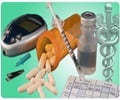Weight loss strategies should be customized based on an individual's biomarkers, which is a big step forward in using personalized nutrition.
Highlights
- Blood sugar (glucose) and/or fasting insulin should be used to select the right diet, particularly for people with pre-diabetes and diabetes.
- The specific diets that will //work for people with diabetes or pre-diabetes differ based on whether a patient has normal blood sugar.
- A fiber-rich diet without calorie restriction will be very effective for pre-diabetics.
- For people with type 2 diabetes, a diet rich in healthy, plant-based fats (such as from olive oil, nuts and avocados) will be effective to achieve weight loss.
Prevalence of Diabetes & Pre-diabetes
According to the American Diabetes Association, 29.1 million people in the U.S. had diabetes in 2012. Each year, 1.4 million more people in the U.S. are diagnosed with diabetes. At that same point in time, approximately 86 million Americans over the age of 20 had pre-diabetes, up from 79 million in 2010.
Individuals with pre-diabetes have higher than normal blood glucose but not yet high enough to be diagnosed as diabetes. Approximately 30 percent of people with pre-diabetes will develop type 2 diabetes over a three-year period.
Studies have found that lifestyle changes and weight loss in the range of 5 percent to 10 percent can prevent or delay the development of type 2 diabetes among high-risk adults.
The studies demonstrate that, for successful weight loss, fasting blood sugar and fasting insulin should be used to select an approach that is proven to work based on those biomarkers.
For people with type 2 diabetes, a diet rich in healthy, plant-based fats (such as from olive oil, nuts and avocados) will be effective to achieve weight loss. The researchers acknowledge that no one solution will work for every patient, but for many in the US and EU these strategies are likely to be more effective than a generic, 'one size fits all' approach.
Weight loss strategies should be customized based on an individual's biomarkers, which is a big step forward in using personalized nutrition to help people achieve greater weight loss success.
"These findings are particularly important as they allow us to provide those with pre-diabetes a custom strategy to help them lose weight, which can ultimately prevent or delay the development of type 2 diabetes."
The University of Copenhagen will continue to participate in and support research to explore additional biomarkers such as gut microbiota and genomics approaches, which may offer more insights and help to better predict success with specific diets.
Reference
- Arne Astrup et al., Fasting plasma glucose and insulin are determinants of dietary weight loss success, American Journal of Clinical Nutrition (2017).
Source-Medindia
















